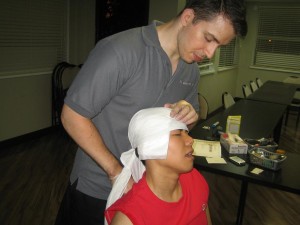Dog bites is a form of dog attack on humans. They can easily become a source of infection if not treated aptly and immediately because of the abundant amount of bacteria present in the mouths of dogs and other animals. Aside from the infection from the bite itself, dogs may be potential carriers of the rabies virus. Rabies is an acute inflammation of the brain that enters the body through a broken skin from infected saliva. Thus, it is always strongly advised to seek medical attention for dog bites unless it is very minor.
There are many possible causes for dog to bite, which can be caused by the aggressive behavior of the dog itself or initiated by human actions. Often, dog bites happen while engaged in everyday activities or interacting with dogs. With dogs closely associated with humans, commonly as pets, dog bites are not unusual. The most common victims of these attacks are children, followed by the elderly. There are millions of reported cases of dog bites every year.
First Aid Management for Dog Bites
First aid management for dog bites will depend on the type of wound caused. The following actions can be done in cases of dog bites
For Superficial Dog Bites (scrapes or gashes):
- Clean the wound with warm water for several minutes to make sure that the wound is cleaned thoroughly
- If there is no hydrogen peroxide available, apply isopropyl alcohol on the wound
- Place a topical antibiotic.
For Puncture Wounds (broken skin):
- Call for local emergency services is large amounts of blood is lost or if the dog bite is in the head or neck
- Allow the wound to bleed for a few minutes to avoid the bacteria from entering the wound. If the dog bite has stopped bleeding, encourage the wound to bleed by squeezing the wound gently.
- For actively bleeding dog bites, apply pressure to the wound using a sterile cloth. Keep the wound elevated.
- For any part of the body that was bitten off, seal it inside a polythene bag or container and place in iced water.

Complications of Dog Bites
Infection is the most common complication that can develop from dog bites. A high grade fever is often a universal sign of an infection. Other complications from dog bites can include:
- Sepsis (infection of the blood)
- Endocarditis (infection of the heart’s inner lining)
- Meningitis (infection of the brain’s outer layers )
How to Prevent Dog Bites
Often, dog bites are not provoked. Due to the territorial nature of dogs, it is sometimes best to avoid the following actions:
- Disturbing a dog while it is resting/ eating/ nursing its puppies
- Running or making too much in front of a dog
- Petting an unknown dog, especially when there is no permission from the owner
For parents, the following tips may help prevent a dog bite from happening to your child:
- Do not leave a child alone with a dog at all times, even if the dog has no prior history of biting or violence
- Do not allow the dog to sleep on the furniture or beg for food as it can confuse the dog of having a higher status than the family member. When the status of the dog is challenged, the dog may become aggressive
- Allow the dog to socialize with many different people, surroundings and circumstances
Dog bites can result from the territorial nature of dogs or initiated by human behavior and can easily result to infection if not treated promptly.
Online Sources:
http://www.nhs.uk/Conditions/Bites-human-and-animal/Pages/Prevention.aspx
